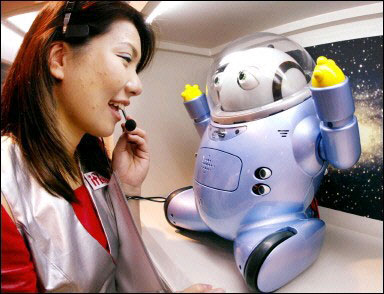Japan: Robots for the elderly are disappointed
Ifbot, the robot who is friends with the elderly at Japanese nursing homes, can talk, sing, express emotions and chat, being ' abandoned ' after two years of launch.
'People only like Ifbot for about a month, then they start to get tired of it,' said Yasuko Sawada, Ifbot's production director in Kyoto, western Japan, shaking her head as she looked at the 45cm tall robot, priced at 495,000 yen. .
'Most older people today don't like robots. They consider robots to be too troublesome and useless, ' explained Ruth Campbell, a Tokyo-based geriatrist.
In fact, older people want these products to fit their needs: easy-to-read guidelines for people with low vision, big buttons to keep people with tremors, and sound must be loud enough for people with hearing loss. Most of the current robot products do not meet these requirements, including Hopis, a pink puppy-like robot that controls blood sugar, blood pressure and body temperature.

Ifbot, the robot friends with the elderly (Photo: Knoxnews)
Faced with sluggish trade, Sanyo has stopped producing this type of robot and began focusing on practical devices for the elderly like kitchens with adjustable height surfaces and phones. Big keyboard for the elderly.
However, not all high-tech products serving the elderly are ' criticized '. For example, I-pot of Zojirushi Corp. This is a type of electric kettle that can send e-mail twice a day to someone who knows their grandmother has had tea. There are about 3,300 devices used in Japan; or Secom Co.'s My Spoon product. - a device that automatically feeds food for people who cannot use their own spoon, currently used in Japan and the Netherlands. Since its launch in 2002, 200 products have been sold.
According to Mieko Ohsuga, a geriatric specialist at Osaka Institute of Technology, expensive and difficult to use prices have made many high-tech products difficult to reach elderly customers.
WALL VY
- The robot that takes care of this elderly person can cause them to die earlier
- Japan focuses on developing robots to serve the elderly
- Robots help the elderly
- Robot P37 S65 - a powerful assistant for seniors
- Thailand is launching robots to care for the elderly
- Robbing the robot in a nuclear accident in Japan
- Chair hug brings joy to the elderly
- Detecting environmental pollution by ... nose
- Robots take care of the elderly
- Singapore investigates dementia and depression in the elderly
- Japan alarmed for H3N2 flu
- Japan: Robots also know how to make sushi, fried pancakes
 'Barefoot engineer' invents a pipeless pump
'Barefoot engineer' invents a pipeless pump Process of handling dead pigs due to disease
Process of handling dead pigs due to disease Radiometer
Radiometer Warp Engine: Technology brings us closer to the speed of light
Warp Engine: Technology brings us closer to the speed of light